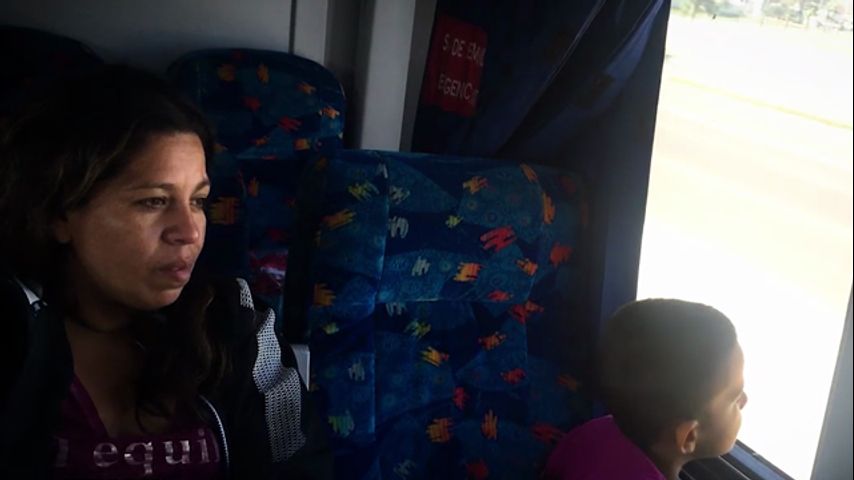Special Report: The Journey
MCALLEN – The government is beginning to make changes when it comes to immigration laws as people continue to make their journey into the Rio Grande Valley.
Most of them are heading north in hopes of finding a new life in the United States. Their trek into new territory may not be legal and can be dangerous but that doesn’t necessarily stop them.
The journey for Maria Molina and her son, Nataniel, started in El Salvador on Jan. 20 and went through Mexico’s tough terrain. They ended up at the McAllen bus station with a ticket to San Antonio.
CHANNEL 5 NEWS joined the family in their travels.
They boarded the bus and passed through the Falfurrias checkpoint. It was Molina’s chance to give her personal information freely.
Border Patrol agents boarded the bus, not letting anything through, and checking everyone’s immigration status – one by one.
Molina held her envelope with a document ordering her to appear in immigration court. It’s her pass to continue her journey.
She will have to decide whether to follow the orders at some time in the future. She said she will.
The San Antonio bus station is the hub for people who spent their last day in Guatemala, El Salvador, or Honduras and are now seeking a sense of freedom.
Like Molina, they carry the envelopes with itineraries to American cities. Some were transported after staying in a family detention facility.
On a busy street in the center of San Antonio is a respite house with 11 bedrooms. According to the staff, it’s generally one mom and one child in a bed.
“You can stretch a bag of potatoes and tomatoes a really long way and everyone’s really creative,” Jenny Hixon with Casa Raices said.
Before a night of rest, the families are given a warm meal. Some of the occupants at the house say the food reminds them of home.
A new crowd of people were dropped off at the center the night before. The manager said 40 immigrants arrived, bringing that count up to 70 people.
“We turn it into like an airport arrival sort of thing,” Hixon said.
Many of the people stay for some time and then make their way to new cities and others stay behind. Yanira Lopez Lucas arrived at the center 18 months ago and decided to stay in San Antonio.
While we were there, she led a group to a dollar store. She took charge and started to live a normal life, she said.
Some of the women in the country illegally are expected to make an appearance in immigration court to determine if they will be removed. They know they’re in need of some legal advice.
Jenna Pollock isn’t too far away from the respite house; she’s a staff attorney for Raices.
“They need us, don’t know how to prepare,” she explained.
Pollock drives to the Karnes City Detention Center, a temporary place for up to 1,500 mothers and children, at least once a week and speaks to the people.
Pollock saw more than 70 clients in one day during her last visit.
“I would love to do more,” she said.
Several of the people face “expedited removal.”
“Which means they can be deported without ever seeing a judge,” Pollock explained.
Immigration courts aren’t criminal courts but are civil courts. In these courts, people who cross the border illegally have no right to a court appointed attorney.
“And most people go unrepresented,” she said.
The detention center sits on the edge of town and people in neighboring homes said they could hear children playing and can smell the food cooking.
Karnes County Sheriff Dwayne Villanueva said he tours the center every few weeks. “It’s a real nice setup,” he said.
The idea the government can catch and release somebody like the people in the detention center is becoming troublesome.
Every month thousands of people cross the river illegally into the Rio Grande Valley. Some are adults, families, single parents and others are children taking the journey alone. The majority of the people are from Central America.
They’re caught at the river or turn themselves in.
If caught, Mexican nationals may choose to return to their country voluntarily. Often they return to Mexico the same day.
The processing and removal for Central Americans takes longer. Some adults wait in detention centers and children go to government-sponsored shelters for immigrant youth.
Families are sometimes sent to detention centers in Karnes City, Dilley or other places. And others are set free.
Finally, they’re processed and released with orders to appear in immigration court on their own recognizance. It falls on their shoulders to show up in court.




